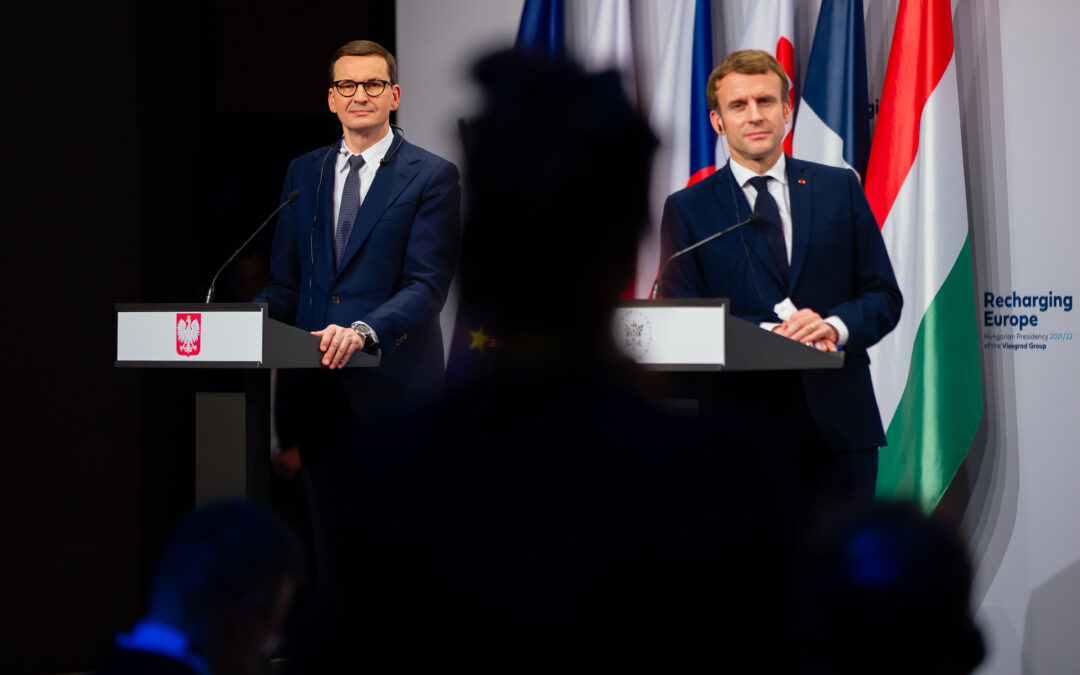French President Emmanuel Macron has accused Polish Prime Minister Mateusz Morawiecki of “interfering” in the French presidential campaign in favour of fellow “extreme right” politician Marine Le Pen.
During an interview with broadcaster TF1 last night, Macron was asked about remarks earlier this week in which Morawiecki criticised the French president (and German chancellor Olaf Scholz) by name over their response to the war in Ukraine.
“President Macron, how many times have you negotiated with Putin? What have you achieved? Did you stop any of these actions? You do not negotiate with criminals, you fight them. Nobody negotiated with Hitler. Would you negotiate with Hitler, with Stalin, with Pol Pot?” asked the Polish prime minister.
Russia has "committed genocide" in Ukraine and must face severe international repercussions, says Poland's PM.
He criticised Macron for holding talks with Putin ("Would you negotiate with Hitler?") and Scholz for prioritising German business interests https://t.co/GGRX0hOypT
— Notes from Poland 🇵🇱 (@notesfrompoland) April 4, 2022
In response, Macron told TF1 that Morawiecki’s “remarks are both unfounded and scandalous, but they do not surprise me” because the Polish leader is “from an extreme-right party” that “supports” Le Pen and has “received her several times” for meetings.
“The Polish prime minister is interfering in the French electoral campaign,” said Macron, who is bidding for a second term in elections that begin in three days. His main challenger is Le Pen, who polls show is around five percentage points behind Macron in the first round and his most likely rival in the subsequent run-off.
The French president also defended his decision to hold talks with Vladimir Putin, saying he “was never naive” or “complacent”, but simply seeking to “avoid war and build a new architecture of peace”.
➡Sur Vladimir Poutine
🗣️@EmmanuelMacron
"Le Premier ministre polonais s'immisce dans la campagne électorale française. J'assume totalement d'avoir parlé constamment avec le président #Poutine. Je n'ai jamais été complice, contrairement à d'autres."#10MinutesPourConvaincre pic.twitter.com/OEuePPtI1u— TF1Info (@TF1Info) April 6, 2022
Over the last two years, Poland’s ruling national-conservative Law and Justice (PiS) party has built close ties with Le Pen. Last October, she met with Morawiecki in Brussels and declared her support for Poland against the EU’s “unacceptable blackmail”.
Previously, in July, she and PiS chairman Jarosław Kaczyński had been among 15 European right-wing and far-right leaders, including Italy’s Matteo Salvini and Hungary’s Viktor Orbán, to sign a declaration on “reforming Europe”.
In December, PiS hosted many of those leaders at a summit in Warsaw, and then met with them again in January this year, with Morawiecki declaring that it was “good to be among friends”.
Even before Russia’s invasion of Ukraine, PiS’s decision to build ties with parties that have been sympathetic towards the Kremlin raised controversy. Polish opposition leader Donald Tusk accused PiS of “treason”.
Previously, even PiS itself had ruled out working with Le Pen due to her Russian ties. In 2017, Kaczyński said that suggestions his party wanted to cooperate with Le Pen were “simply fraud and manipulation”. He added that “we have as much in common with Le Pen as with Putin”.
As recently as 2019, the PiS chairman said that Le Pen’s party is “obviously linked to Moscow and receives its support”. He raised concern that its “policies could be adjusted by the Kremlin if they became a strong force in the EU”.
Since last year, however, in the face of criticism for building ties with the likes of Le Pen and Salvini, PiS has argued that by doing so it can help them understand the dangers posed by Russia and persuade them to adopt a harder line towards the Kremlin.
At the time of writing, neither Morawiecki, PiS nor the Polish government have responded to Macron’s accusations of interference in the French election campaign.
Main image credit: Krystian Maj/KPRM (under CC BY-NC-ND 2.0)

Daniel Tilles is editor-in-chief of Notes from Poland. He has written on Polish affairs for a wide range of publications, including Foreign Policy, POLITICO Europe, EUobserver and Dziennik Gazeta Prawna.




















